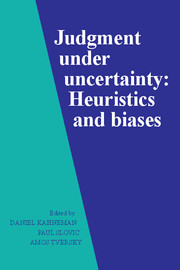Book contents
- Frontmatter
- Contents
- List of contributors
- Preface
- Part I Introduction
- Part II Representativeness
- Part III Causality and attribution
- Part IV Availability
- 11 Availability: A heuristic for judging frequency and probability
- 12 Egocentric biases in availability and attribution
- 13 The availability bias in social perception and interaction
- 14 The simulation heuristic
- Part V Covariation and control
- Part VI Overconfidence
- Part VII Multistage evaluation
- Part VIII Corrective procedures
- Part IX Risk perception
- Part X Postscript
- References
- Index
13 - The availability bias in social perception and interaction
Published online by Cambridge University Press: 05 May 2013
- Frontmatter
- Contents
- List of contributors
- Preface
- Part I Introduction
- Part II Representativeness
- Part III Causality and attribution
- Part IV Availability
- 11 Availability: A heuristic for judging frequency and probability
- 12 Egocentric biases in availability and attribution
- 13 The availability bias in social perception and interaction
- 14 The simulation heuristic
- Part V Covariation and control
- Part VI Overconfidence
- Part VII Multistage evaluation
- Part VIII Corrective procedures
- Part IX Risk perception
- Part X Postscript
- References
- Index
Summary
Every day the social perceiver makes numerous, apparently complex social judgments – Predicting another's behavior, attributing responsibility, categorizing an individual, evaluating anothers, estimating the power or influence of a person, or attributing causality. A central task of social psychology has been to determine how the social perceiver makes these judgments. Until recently, research on this topic was marked by a rationalistic bias, the assumption that judgments are made using thorough, optimal strategies (see, for example, Fischhoff, 1976, for discussion of this point). Errors in judgment were attributed to two sources: (a) accidental errors due to problems with information of which the perceiver was presumably unaware; and (b) errors which resulted from the irrational motives and needs of the perceiver.
Within social psychology this perspective is represented by research on causal attribution. In early attribution formulations (e.g., Jones & Davis, 1965; Kelley, 1967) the social perceiver was characterized as a naive scientist who gathered information from multiple sources in the environment to make attributions regarding cause-effect relations. When departures from these normative models were observed, they were believed to stem from biases such as hedonic relevance (Jones & Davis, 1965) or other egocentric needs (see Miller & Ross, 1975).
Information
- Type
- Chapter
- Information
- Judgment under UncertaintyHeuristics and Biases, pp. 190 - 200Publisher: Cambridge University PressPrint publication year: 1982
Accessibility standard: Unknown
Why this information is here
This section outlines the accessibility features of this content - including support for screen readers, full keyboard navigation and high-contrast display options. This may not be relevant for you.Accessibility Information
- 91
- Cited by
